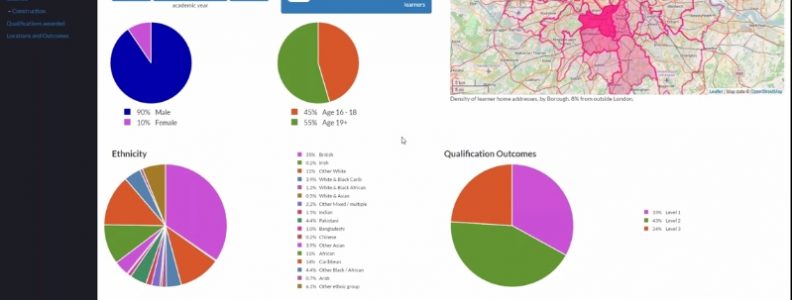Explaining SkillsPlanner has started to get a bit easier. While it is not yet ready for public consumption, we have been developing some of the concepts first shown at the project’s official launch in February and now have our first demonstration environment.
In February, the images used in Sir Nigel Shadbolt’s presentation (watch the video) at the Institution of Civil Engineers were what he described as “slideware”. Today, we have some working prototypes of key elements of the SkillsPlanner platform. For example, in an internal project webinar run by our data and platform package leaders, Gary Hunt and Ian Millard, on 26 April, we were able to show:
- examples of the kinds of data we are collating from public sources, project partners and collaborators
- our data catalogue (the list of datasets that we have collated to date to populate the platform)
- examples of different types of data reports – from simple tables, to pie-chart graphics, to maps showing geographical spreads and densities of data
We are currently exploring a variety of “user stories” – essentially, analysing how individual end-users will interrogate the datasets and understanding what insights they are seeking to get. In some cases we can map their requirements to data that we already have; in other cases, we are learning what data we need to add. Gary outlined some of the next steps:
“Some of this data might be publicly available and we’re making good progress cataloguing these. Other data, such as individual learner data, is available but under a restricted license so we’ll be working to gather that data. In all our work, we are being scrupulous in how we filter, aggregate and anonymise data so that no commercially sensitive information is shared and to ensure compliance with the Data Protection Act.”
Questions included: How do we decide what data to include? How will we link training provider courses to job roles? How is our data managed and maintained? and How do we ensure data remains current? (The webinar recording and Q&As are available for collaborators). We will be sharing further developments with project collaborators in another webinar next month (June 2016) as we build towards the point where we can start to show the demonstration platform to a wider industry audience.



 “This is a bold and ambitious two-year pilot…. SkillsPlanner has the potential to link employer demands for skills qualifications and behaviours to a responsive education and training sector who can train the individuals who can and will be the future of our industry. And I really hope this vision becomes a reality over the next couple of years …. let’s see what we can do to make something of this because we do need change. And this is a really exciting opportunity to secure that change….”
“This is a bold and ambitious two-year pilot…. SkillsPlanner has the potential to link employer demands for skills qualifications and behaviours to a responsive education and training sector who can train the individuals who can and will be the future of our industry. And I really hope this vision becomes a reality over the next couple of years …. let’s see what we can do to make something of this because we do need change. And this is a really exciting opportunity to secure that change….” It was an amazing evening. There was a real sense in the room of people truly understanding the potential of SkillsPlanner and fully agreeing with the principle of open collaboration. The number of emails I have received today committing to supporting SkillsPlanner has been quite simply brilliant.
It was an amazing evening. There was a real sense in the room of people truly understanding the potential of SkillsPlanner and fully agreeing with the principle of open collaboration. The number of emails I have received today committing to supporting SkillsPlanner has been quite simply brilliant. Judging from Twitter (see
Judging from Twitter (see 
